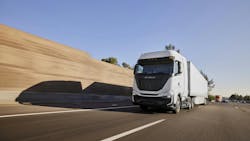Nikola's Q3 report a mix of growth and loss
Nikola Corporation, the first truck OEM to deliver fuel cell electric trucks, continues to see some growth in the bourgeoning hydrogen mobility sector, though the Phoenix-based company's third quarter results show revenue and reliability are still major concerns.
On the postive side, the company wholesaled 88 Nikola FCEVs, up 22% from Q2. The first hydrogen-powered trucks were delivered late last year. In 2024 Nikola has sold 200 units; 40 were sold in Q1. According to CEO Steve Girsky, the expected total volume for this year is 300-350.
Girsky said the hydrogen fueling side of the business, Hyla, expects to deliver 10 mobile refueling stations by year-end. This year, total hydrogen dispensing at the locations has grown 350%.
In operation, Girsky noted the FCEVs are more regularly cresting a 400-mile range. In Q3, there were 285 total runs above that mark, a 50% jump.
“[A]s fuel availability increases, and fleet operators get more comfortable with the technology, they are pushing the fuel cell electric vehicle to perform the way it is built to,” Girsky said.
Christian Appel previously told Fleet Maintenance fleets demoing the trucks will start on shorter routes "because they have been suspicious about the range and the performance, and so they don't want to push it.”
JB Hunt and Biagi Brothers both have several FCEVS in their fleets. California Drayage fleet AiLo placed an order for 100 trucks in May, with deliveries expected in 2025. The California Air Resource Board's Advanced Clean Fleets rule mandates all drayage trucks be zero-emissions by 2035.
One early adopter hauling from the Port of Oakland to the Port of Long Beach has had a streaky year in terms of technology hiccups and fueling disruptions, though has routinely made journeys over 400 miles.
In the summer, Nikola had said demo uptime was at 93%. Because hauling freight in the real world for tens of thousands of miles is far different than carefully controlled pilots, we are waiting to hear back from the company on an offical uptime update.
Nikola BEVs
The company also has an update on its battery-electric vehicles. Last summer all 209 were recalled due to severe risk of fire. Several were incinerated due to a battery coolant leak. Nikola has allegedly fixed the issue and returned 78 of the vehicles, now the BEV 2.0, to owners’ hands, cutting the backlog in half.
Girsky said BEVs still play a role “in most national fleets,” and the company would continue to remanufacture them beyond the recalled units.
“While we believe that the fuel cell truck is the best option for most of our customers' use cases, we also believe that our BEV truck plays a role in most national fleets,” he said.
The re-issued trucks received “overwhelmingly positive” feedback from users, Girsky said.
The BEV 2.0's range has slightly improved over the recalled trucks: 130 miles to 143 miles. About one-third of all runs have passed 200 miles.
Nikola has about 150 BEVs in inventory and plans to produce more.
“We've always harped on with one truck platform, two powertrain options, all zero-emission,” Girsky said. “But up till now, we've really only had one or the other in the market, either the BEV or the fuel cell […] So, as we make progress through the recall next year, we are getting a pull from the BEVs and we will start selling [them] from Nikola’s inventory.
Revenue misses estimate
Nikola’s Q3 revenue was $33 million, a slight improvement on $31 million in Q2, the previous high point. This latest net total was hampered by an $8 million spend to repurchase of 20 BEVs. Girsky said a purchase order is in place to sell these to another dealer, so that revenue would appear in Q4.
Alos hurting revenue, the average sale price dropped 7% to $361,000. Losses were $7 million higher in Q3 vs. Q2.
CFO Tom Okray said Nikola's $198 million in cash will get them through Q1 of next year, but not beyond that. The company is “examining every opportunity” to optimize cash, he said.
This may include finding new partners to work with, as well as shortening the time it takes to process sales and vouchers, working out dealer floor planning issues, and reorganizing the company structure.
In June, Nikola performed a reverse split. The share price for Nikola (Ticker: NKLA) has also trended downward over the last three months. Opening at $4.16 per share on Oct. 31, the price as of Nov. 8 was around $3.00. The total value has fallen 99%.
